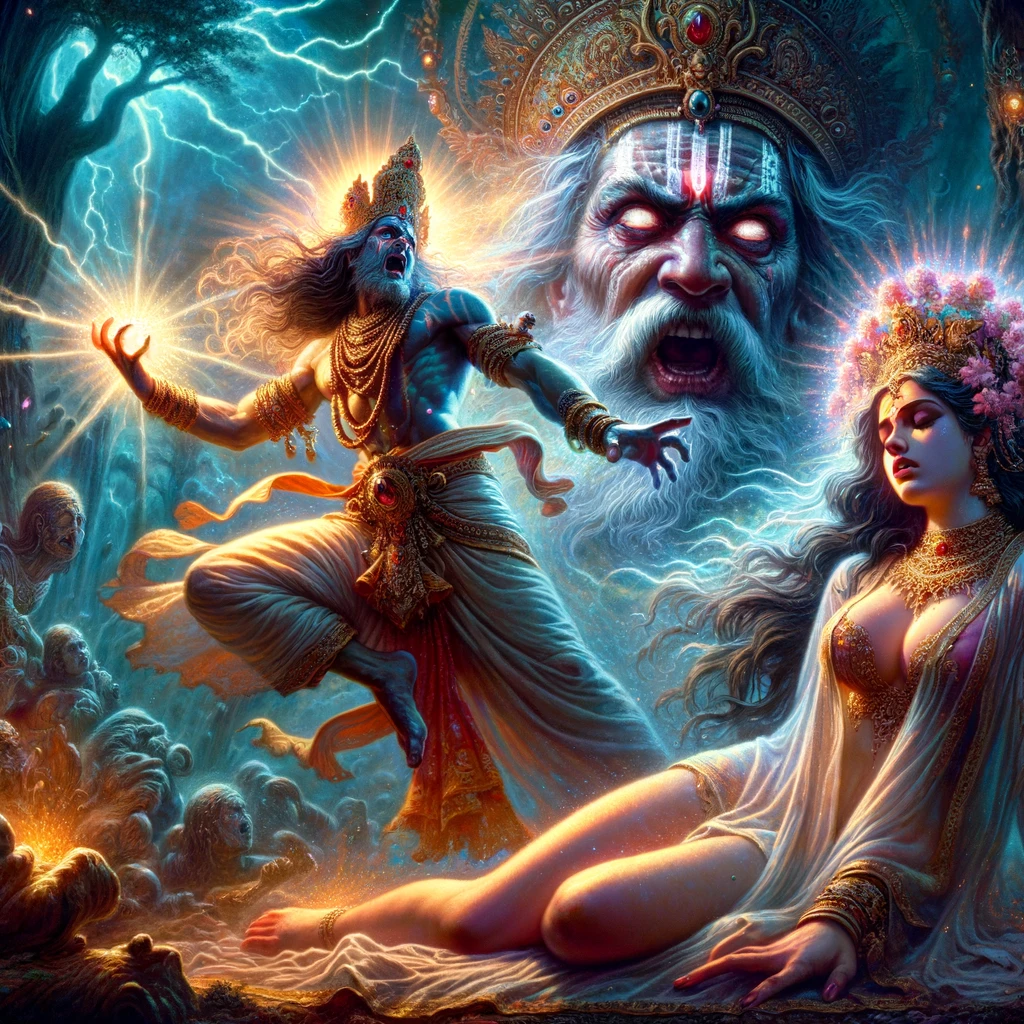Summary
Vishvamitra curses Rambha, the celestial wench, knowing that she arrived at the behest of Indra to cause hindrance to his asceticism. But later feels ashamed to loose his tongue and then he is determined to undertake another round of asceticism to conquer is own senses.
Chapter [Sarga] 64 – in Detail
Oh, Rambha, now you have to undertake this very great task of Gods in enchanting Vishvamitra with a craving caused by lust, for lusting after you.' Thus Indra ordered Rambha... Thus Sage Shataananda continued the legend of Vishvamitra to Rama. [1-64-1]
Oh, Rama, when that celestial wench is spoken thus by the Thousand-eyed Indra, she diffidently [shyly] said to that chief of Gods while adjoining her palms suppliantly [humbly]. [1-64-2]
Oh, chief of Gods, Indra, that great saint Vishvamitra is a dangerous one and undoubtedly he releases his deadly anger on me. Oh, God, thereby I am fearful of him. Hence, oh, God, it will be apt of you to accord forbearance [patience]. So said Rambha to Indra. [1-64-3, 4a]
Oh, Rama, the Thousand-eyed Indra replied Rambha when she spoke to him in that way while shuddering in fear and making palm fold in supplication. [1-64-4b, 5a]
'You need not be fearful, Rambha, carry out my command, safe betides you, I on becoming a heart-stealing black-songbird will be at your side along with Love-God in the pleasing trees of springtime. [1-64-5b, 6]
'Indeed on your assuming a highly sparkling semblance [actual or apparent resemblance], and multi-multiplexing your savoir faire [literally, knowing how to do], with bon viveurs [food] and bon vivants [a person having cultivated, refined, and sociable tastes], you disengage that ascetical sage Kaushika from his asceticism.' So said Indra to Rambha. [1-64-7]
On hearing the sentence of Indra she adopted an unexcelled physique, and on becoming a pulchritudinous [physical having a pleasing appearance] damsel she started to entice Vishvamitra with giggly [to laugh with repeated short catches of the breath] grins [smile]. [1-64-8]
Vishvamitra has heard melodious trilling tune of songbird, and while his heart is highly gladdening about the ambience, he incidentally saw and stared at Rambha. [1-64-9]
By the exceptional trilling tune of that songbird and by the unexceptional tableau of Rambha the sage is on his qui vive [lookout]. [1-64-10]
On knowing that as an escapade of the Thousand-eyed Indra, Vishvamitra is enwrapped in wrath and he cursed Rambha. [1-64-11]
Whereof you tried to entice me who am wishing to win over the wanton [lust] and wroth [angry], you unlucky female Rambha, thereof you will become a rocklike statued wastrel [a piece of property]. [1-64-12]
A highly resplendent Brahman who is ascetically powerful redeems you, oh, Rambha, who are now blemished by my anger.' Vishvamitra cursed Rambha in this way. [1-64-13]
Thus the great-resplendent Vishvamitra became compunctious [distressed] when that great-saint could not contain his anger in uttering an angry curse. [1-64-14]
Then Rambha has become a rocklike statue by that great curse of Vishvamitra, and having heard the words of that great-saint Love-God and Indra also took flight. [1-64-15]
Owing to his angering that great-resplendent Vishvamitra is now divested of his ascetical merit, and he has no peace of mind owing to ungovernable senses. [1-64-16]
His conscience became sentimental owing to the divesture of his ascetical merit, and he soliloquized [talk to oneself], 'I shall not succumb to wrath in anyway, nor I put my presentiment [sense or mind] into words.' [1-64-17]
'Otherwise, I do not even respire for a hundred years for the respiratory gestures will also exhibit moods, and I indeed emaciate myself until I become a real conqueror of my own senses. [1-64-18]
Till such time as I acquire Brahman-hood with the merit of my own asceticism I will be breathless and foodless, even if it is going to take endless years, and while I am in asceticism my bodily organs indeed will not undergo any deterioration.' So said Vishvamitra to himself. [1-64-19]
Thus that eminent sage abided by the commitment to the vow for a thousand years, oh, Rama, the legatee of Ragu, which is a nonpareil [having no equal] vow in the world. Thus Shataananda continued. [1-64-20]
Thus, this is the 64th chapter in Bala Kanda of Valmiki Ramayana, the First Epic poem of India.
Sriman Moola Rama Vijayate


